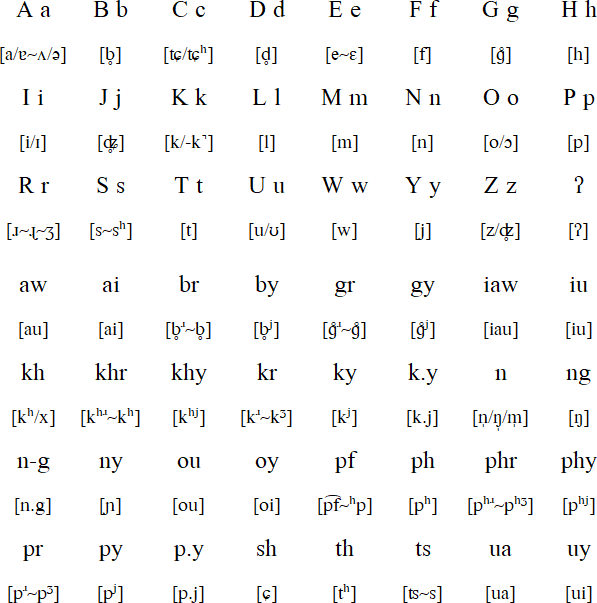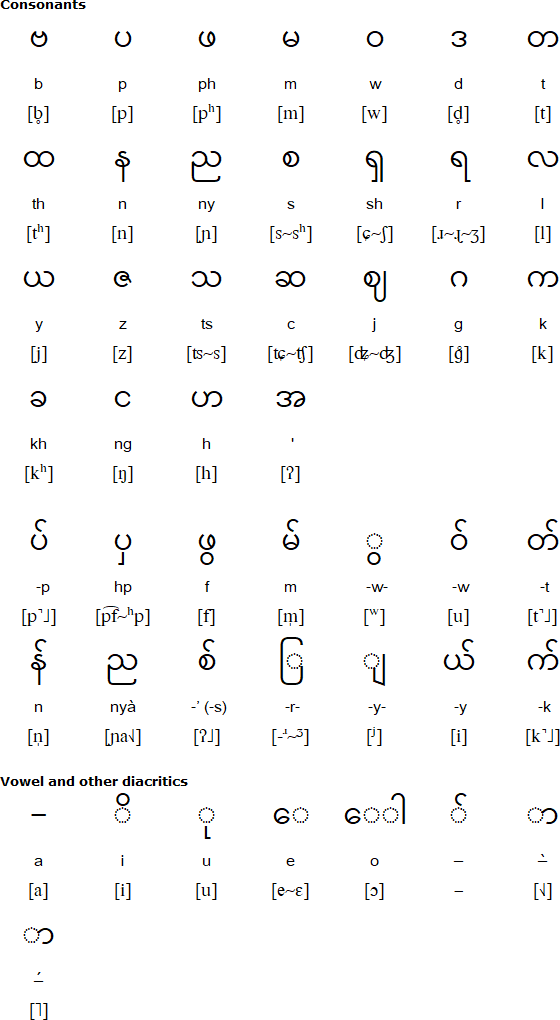Jingpho is a member of the Sal branch of the Tibeto-Burman language family spoken mainly in Kachin and Shan States in Myanmar/Burma. There are also Jingpho speakers in Yunnan in the southwest of China, and in Assam and Arunachal Pradesh in northeast India. In 2001 940,000 people spoke Jingpho.
Jingpho is also known as Jinghpaw, Chingp'o or Kachin. The variety spoken in India is known as Singpho.
Jingpho was first written by American missionaries during the late 19th century using the Latin alphabet. Their spelling system was reformed in 1965. The Burmese script is most commonly used to write Jingpho today.

Hear the pronunciation of Jingpho letters

The symbol _် is used to indicate that a consonant at the end of a syllable is without a vowel.
Notes about Jingpho by Wolfram Siegel
Download alphabet charts for Jingpho in PDF or Excel format.
Information about Jingpho scripts provided by Wolfram Siegel
Dai rai nna, nanhte go ning ngu akyu hpyi mu, Sumsing lamu na anhte a Wa e, Na a amying nsang chyoi pra nga lit ga; Na a mungdan du wa ruga; Lamu tang hta, na a myit dik nga ai hte maren, ga ntsa e mung, dik lit ga lo; Anhte hta ra ai lusha, dai ni anhte hpe jo mi; Masha ni anhte hpe shut ai mara, anhte ro kau ya ai zon, anhte a mara hpe mung ro kau ya mi; Agung alau nga ai de, anhte hpe n sa shangun ai sha, N kaja ai lam hta na, sho la mi lo.
Information about Jingpho | Numbers
Information about Jingpho
https://en.wikipedia.org/wiki/Jingpho_language
https://www.ethnologue.com/language/kac
http://www.ethnologue.com/18/language/sgp/
http://repository.tufs.ac.jp/bitstream/10108/73109/1/aall7_8.pdf
Arakanese, Balti, Chocha Ngacha, Drung, Hajong, Hmar, Jingpho, Lepcha, Lhao Vo, Lhomi, Magar, Manipuri, Mro, Naxi, Newar, Pahari, Tangkhul Naga, Tujia, Yolmo
Aiton, Akha, Arakanese, Burmese, Eastern Pwo Karen, Jingpho, Khamti, Marma, Palaung, Pa'O, S'gaw Karen, Tai Laing, Tai Phake, Western Pwo
Page last modified: 05.07.24
[top]
You can support this site by Buying Me A Coffee, and if you like what you see on this page, you can use the buttons below to share it with people you know.

If you like this site and find it useful, you can support it by making a donation via PayPal or Patreon, or by contributing in other ways. Omniglot is how I make my living.
Note: all links on this site to Amazon.com, Amazon.co.uk
and Amazon.fr
are affiliate links. This means I earn a commission if you click on any of them and buy something. So by clicking on these links you can help to support this site.
[top]